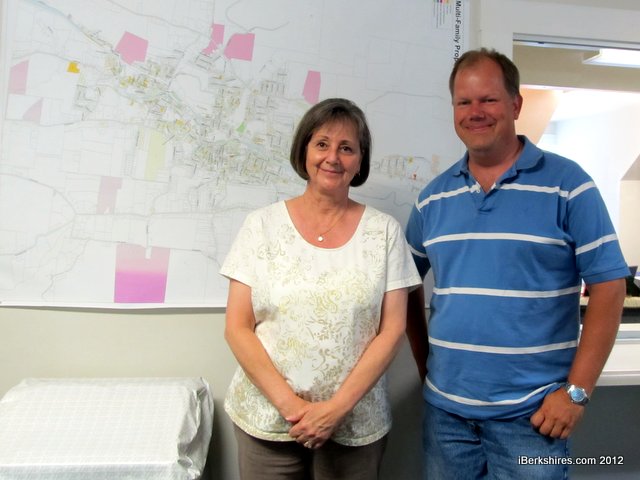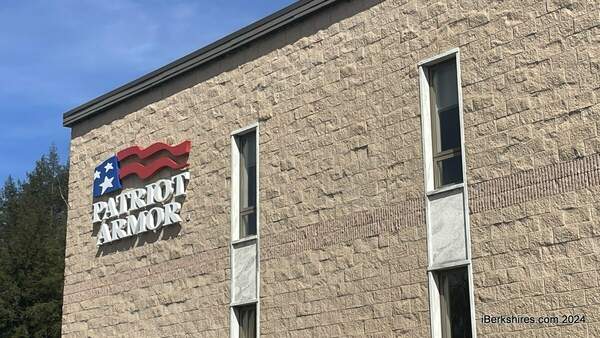
Berkshire Dirty Jobs: Code Enforcers Keeping It Clean
Editor's Note: This is the first in our semi-regular series on 'dirty jobs' in the Berkshires. We're digging into occupations that can be messy, mucky and, sometimes, a bit rank. We're starting with the people who enforce the health codes; next up — septic work. Do you have a dirty job or know someone who does? Drop us a line at info@iberkshires.com and we might highlight your dirty work. Administrative Assistant Susan Foster and Code Enforcement Officer Scott Koczela do the town's dirty work by enforcing sanitation codes. |
Koczela is the code enforcement officer for the Board of Health and Foster is the administrative assistant.
From signing off on how a body is transferred to a cemetery to inspecting restaurants to cleaning up the properties of hoarders, the Board of Health has a lot on its plate.
Although Koczela is running between field inspections, housing court and the office and Foster is fielding complaints and filing the paperwork, not many know what the office does on a daily basis. With that in mind — as well as an admiration for Studs Terkel — iBerkshires sat down with the two recently to hear from them exactly what the job entails.
Q: What is a typical day like?
SK: The first thing is to come and look at the phone to see what kind of messages we have and that tells us what kind of day we're going to have. On Mondays, it seems that on the weekends is when all the emergencies occur. So, if we don't get called out by the Police or Fire Department, it all depends.
I do pre-rental inspections here and that's a program the town set up in August 2005, when any vacant apartment becomes occupied it has to be inspected by the Board of Health to ensure it meets the minimum standards of the health and sanitation code. We do those on an as-call basis.
Then we usually have people call or come in with complaints and they can range anywhere from someone dumping their garbage to unsafe living conditions that they may have in their apartment or home or it could be someone they know and they have concerns. We're mandated to go out and investigate those. We do an investigation and do up an enforcement order for either a landlord or a tenant — we can cite tenants also — or a property owner.
Q: What do you find the most?
SK: A lot of it seems like landlord and tenant disputes. We learned a lot time ago that before you jump to any conclusions on the stories you hear, you really need to get both sides of the story. A lot of times it can be based on a retaliation kind of thing — someone is getting evicted and they're trying to get back at the property owner or they think it is an attempt to build a case so that they can be evicted.
We always find out first whether or not the complainant has talked to the other party about their concern. ... If it creates a public nuisance or hazard, then we deal with it.
SF: We get quite a lot of complaints in the summer for tall grass especially on foreclosed properties. A lot of times it is an out-of-town bank that is holding the mortgage so they don't necessarily think to come over so we do get those complaints. We get a fair amount of garbage smells and dirty Dumpsters in the summer too because it odorous.
Q: What are your guidelines?
SK: We have what's called a 410 and that's our state sanitary codes. (Foster characterized it as "our Bible.") Probably about 20 pages of that are actually codes and the rest is administration. We do have one tool and that is the nuisance statute that we use and that's pretty much up to the inspector and the agency in determining whether or not it creates a public nuisance. An example of something we use that on would be like excessive unregistered vehicles or torn apart cars in a yard.
SF: Nuisance is broadly defined as something that prevents a homeowner from enjoying their property. If something the adjoining neighbor is doing is preventing them from enjoying their property. Say somebody has campfire every night and sits around and drinks beer for four hours, that smoke is constantly coming into the person's home, into the laundry, that can be a nuisance... It can cover quite a bit and it is up to our discretion of what that would be.
Q: How long have you been here?
SF: I've been here 10. SK: Just about eight.
Q: What would be the oddest complaint that you've had to deal with?
SK: I got a call that someone defecated on the sidewalk and the person told me where the individual was, that they walked into a local restaurant to have lunch. I had to go get them off a barstool and have them pick it up. I never thought I'd deal with anything like that.
One thing I was never prepared for was hoarding calls. We've had quite a few of those. Those are very, very difficult to deal with because unlike the television show where they've got cleanup crews and psychologists and professional cleaners, we don't have that. We're it and we have to reach out family members, friends of the individual, religious groups and usually there is no money available. It has to be done on a voluntarily basis. Not many of the individuals that we cite for hoarding are capable of rectifying the problem on their own and they'll fight pretty tooth and nail in doing so.
SF: We have a lot of repeat offenders. It's a really tough psychological condition for them to master. I think two or three times on some of our good cases and several times on others. A lot of times it ends up with a lien on their property because we've incurred costs to clean it. We've had to condemn homes because of it.
.jpg) Trash piling up in the vacant buildings behind the former Albert's Hardware is just one of the many cases Koczela has been involved with this year. |
SF: No. I don't know if I really had one before Scott came. We knew of one but there was never a complaint so it was kind of sitting there and we were kind of watching it. But when Scott came as the new enforcement officer it was a created position — then we were really able to get into some of these issues. We have three elected Board of Health members, who get a small stipend but they don't have the training always.
Actually, Adams got looked at as the expert in hoarding cases for Berkshire County. We got so good at it, I guess.
Q: Can you give me a sense of how many hoarding cases a year?
SK: If we got anymore than one a year, it would probably overwhelm us. One of those cases takes six months. It's very time consuming.
Q: I would imagine that you are not a well-received person for a lot of people. Have you had instances where you've been attacked or threatened?
SK: I am the enforcement officer and people don't like to be told what to do. I have had instances where I've had the police along with me, I've been threatened. I had one individual come up [to the office] and made threats of physical violence against me. So, yeah, it is a concern of mine ... I have a message on my machine right now where I'm called an a-hole. We try to approach people as nicely as possible but some people don't take well to it.
SF: I've been scared a few times. We have a few [people] that are kind of creepy.
Scott is the enforcer. They don't want to see Scott for the most part unless it is apartment inspections or something simple because it is usually called to their residence. They don't usually get too mad at me because I'm the nice person on the phone.
SK: The truth is, she can be 10 times meaner than I can. There was the contractor that threw a fit in the basement ...
SF: He threw a fit and came in and gave me all kinds of [grief] and then he went and sat in the hallway. I got right back up, out of my chair, and just like how your mother used to wag her finger right in your face, I went right up to him and told him 'you will never talk like that again.' He apologized all over himself. So, yeah, every once in a while you've gotta.
Q: The Board of Health, it's really a dirty job. Let's hear another story. What is the most disgusting thing you've encountered?
SK: Probably the way that some people live. People will have animals living in their house or apartment and they'll let them urinate and defecate everywhere.
SF: Sometimes with children in the house.
SK: Yea, whenever a child is affected, we always go in and made sure DCF is aware of that. It's one thing when you have an adult that creates a situation like that they're determining their own destiny. But when it is an animal or a child in a situation like that, it becomes more urgent to make sure the conditions are safe. They have no control over that.
But, we have the hoarding cases that can be very, very bad depending on what the individuals are hoarding. One of the individuals we had like to hoard food, which would spoil and be rancid — just walls of flies. I've gone to cases where there have been a flea infestation where I have to wear protective clothing. Roaches.... certain standards of living, which you and I wouldn't consider very sanitary.
Q: How much time do you find yourself in housing court?
SK: Probably three to four hours a week. We're one of the towns that use it quite a bit. It meets every Wednesday in Pittsfield. What we usually do is that is our last resort. If someone is outright ignoring us or refusing to comply with our orders in a reasonable amount of time, we'll file. A lot of the time, just getting that sheriff's service that we're bringing them to court will make it a little bit more urgent to talk to us or get things done. If it is done before court, we just dismiss the case.
SF: Housing court is a special court by the state. It's a full court but it is only housing issues whether it is tenants going to court, landlords, whatever if it is an occupancy type issue or the building department can us it structure wise. It's great. Once they created that, it's been a godsend to us. ... It really gave us the teeth that we needed.
Q: How many complaints do you typically get and how many of those complaints end up being nothing?
SF: I'd say half of them turn out to be nothing because we resolve them without anything major. That's our first offense, to try to work things out with the people. We'll visit with them and we'll do whatever we can.
SK: The snow in the winter helps to cover up the sins of the warmer weather... what you don't see under the snow. Our biggest fear is when there is no heat in the winter. Those have to be dealt with immediately.
Q: What have been some of the more dire situations?
SF: I can think of one instance where there was no electricity in an apartment and the lady had a baby. She was heating up the baby's bottle on the barbecue grill and the owner was aware that there was no electricity and he did not care.
SK: We went through a few years with Richard Doherty and Daniel Borer owning a lot of our multi-families in town. When their empire started to crumble, we had literally dozens of calls on their property. With Borer it got to the point where the court had a receiver appointed and took away control of all of his buildings and had someone else run them all. That was very successful.
SF: These particular landlords were leaving people without heat, hot water, electricity. They really did not care.
Q: How have things changed? Are things getting worse?
SF: There is a huge difference from when I started here. Huge. I used to get hardly any phone calls. The complexity. I think everything has gotten so complex. We never took anyone to court. People have changed over time and not for the best.
Q: What are your theories on why things are getting worse?
SF: Probably some of it is the economy. And I think we have an element, we call them professional tenants, that will move from one not so good landlord to another not so good landlord. They don't check references of those who have money in hand and will rent to anybody. We've had out-of-town people coming in. I think a lot of it is the caliber of some of the tenants — not all of them, we still have some really good tenants and I don't want to make it seem like all of them are bad — but there is a certain element that was not here before.
I think drugs have a lot to do with it. People are unemployed nowadays. I think it's affected the whole economy.
SK: The change in society has really led to what we're having right now. People really have lowered their standards of living a lot.
Q: What else do you do?
SF: There is a whole permitting process that is done here. It could be retail, food, it could be milk, it could be frozen food. We also do septic permits, well permits, burial permits. To move a body from point A to point B is like a chain of command. Just like a drug test, everyone has to sign off. At every point in time, they need to know where that person is so I issue a permit to the funeral home to transport the body to the Pittsfield crematorium for example.
I also do the Board of Health meeting monthly. I'm part-time health and part-time Conservation Commission but the majority of my work, I'd say 95 percent is Board of Health. It's so needed. We also do disease reporting and follow-up more than we used to. There is a new electronic reporting system that I am learning how to use.
Q: What is the extent of the training and education that you've had to go through?
SF: Anything that we didn't know how to do, we went to a training. In our early years we trained all the time because we didn't know what to do. It was on the job training so we took everything from food training to housing training to lead inspection. There are a lot of little things that we do ...
Scott also has traveled to Alabama twice for FEMA for anti-terrorist training and he's been in buildings where they're pumping gas in and he's in a suit.
SK: Yea, I was in there with nerve agent at the last training.
Q: I've now heard stories of the most disgusting but do you have any really good stories, something in that the way it was resolved was very positive?
SF: Our best times is when somebody says thank you for helping us. We always get 'I had this issue, I have this issue, you need to fix it.' Demanding. But every once in a while you get somebody who says thanks, you really helped me out. That will so make our day and that is rare.
SK: There was one individual where we had to condemn his apartment one time because it was really, really bad and he had a child living with him. About six months after the case was opened, I ran into him and he approached me and was thinking 'oh boy, this can't be good.' The guy actually thanked me. He said 'I was at a really low point in my life and you coming in, gave me that push to get my life back in order.'
That felt good to know that I made a positive change in someone's life.
Tags: board of health, code enforcement, dirty jobs, hoarding, infestations, public health,















